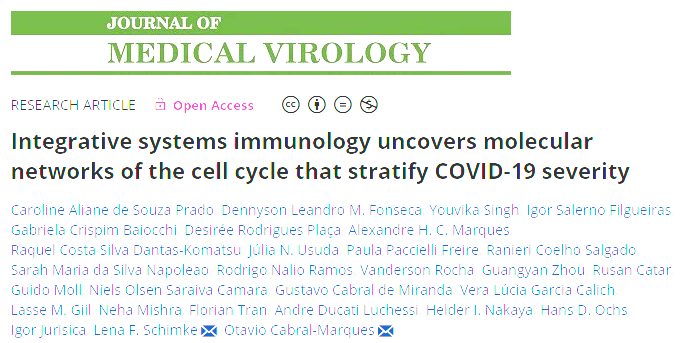Integrative systems immunology uncovers molecular networks of the cell cycle that stratify COVID-19 severity
Several perturbations in the number of peripheral blood leukocytes, such as neutrophilia and lymphopenia associated with Coronavirus disease 2019 (COVID-19) severity, point to systemic molecular cell cycle alterations during severe acute respiratory syndrome coronavirus-2 (SARS-CoV-2) infection. However, the landscape of cell cycle alterations in COVID-19 remains primarily unexplored. Here, we performed an integrative systems immunology analysis of publicly available proteome and transcriptome data to characterize global changes in the cell cycle signature of COVID-19 patients. We found significantly enriched cell cycle-associated gene co-expression modules and an interconnected network of cell cycle-associated differentially expressed proteins (DEPs) and genes (DEGs) by integrating the molecular data of 1469 individuals (981 SARS-CoV-2 infected patients and 488 controls [either healthy controls or individuals with other respiratory illnesses]). Among these DEPs and DEGs are several cyclins, cell division cycles, cyclin-dependent kinases, and mini-chromosome maintenance proteins. COVID-19 patients partially shared the expression pattern of some cell cycle-associated genes with other respiratory illnesses but exhibited some specific differential features. Notably, the cell cycle signature predominated in the patients' blood leukocytes (B, T, and natural killer cells) and was associated with COVID-19 severity and disease trajectories. These results provide a unique global understanding of distinct alterations in cell cycle-associated molecules in COVID-19 patients, suggesting new putative pathways for therapeutic intervention
Authors
Prado CAS, Fonseca DLM, Singh Y, et al.
External link
Publication Year
Publication Journal
Associeted Project
Integrative Biology
Lista de serviços
-
As antisense RNA gets intronic.As antisense RNA gets intronic.
-
Androgen responsive intronic non-coding RNAs.Androgen responsive intronic non-coding RNAs.
-
Conserved tissue expression signatures of intronic noncoding RNAs transcribed from human and mouse loci.Conserved tissue expression signatures of intronic noncoding RNAs transcribed from human and mouse loci.
-
The intronic long noncoding RNA ANRASSF1 recruits PRC2 to the RASSF1A promoter, reducing the expression of RASSF1A and increasing cell proliferation.The intronic long noncoding RNA ANRASSF1 recruits PRC2 to the RASSF1A promoter, reducing the expression of RASSF1A and increasing cell proliferation.
-
Antisense intronic non-coding RNA levels correlate to the degree of tumor differentiation in prostate cancer.Antisense intronic non-coding RNA levels correlate to the degree of tumor differentiation in prostate cancer.
-
Insight Into the Long Noncoding RNA and mRNA Coexpression Profile in the Human Blood Transcriptome Upon Leishmania infantum Infection.Insight Into the Long Noncoding RNA and mRNA Coexpression Profile in the Human Blood Transcriptome Upon Leishmania infantum Infection.
-
Long non-coding RNAs associated with infection and vaccine-induced immunityLong non-coding RNAs associated with infection and vaccine-induced immunity
-
Comparative transcriptomic analysis of long noncoding RNAs in Leishmania-infected human macrophagesComparative transcriptomic analysis of long noncoding RNAs in Leishmania-infected human macrophages
-
SARS-CoV-2 Selectively Induces the Expression of Unproductive Splicing Isoforms of Interferon, Class I MHC, and Splicing Machinery Genes.SARS-CoV-2 Selectively Induces the Expression of Unproductive Splicing Isoforms of Interferon, Class I MHC, and Splicing Machinery Genes.

